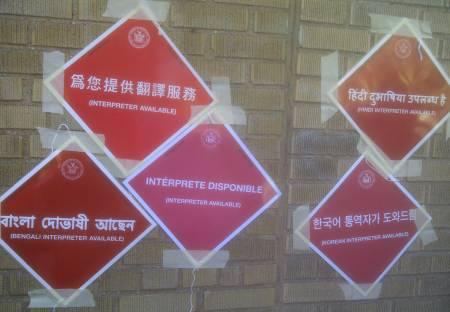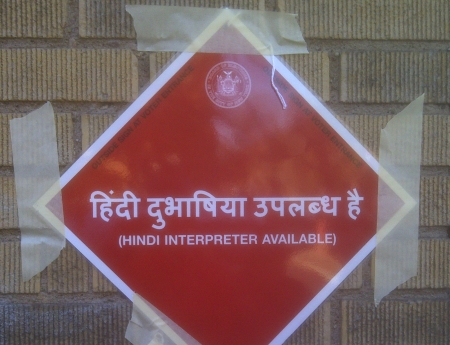
Aseem Chhabra stood for 80 minutes in near freezing temperatures to vote, the longest he has waited in 20 years. All around him, a sea of immigrants anxious to cast their ballot.
Whether Barack Obama wins or not, I want him to know this. I have so much faith in him that I stood for nearly an hour and 20 minutes in long lines -- part of the time outside in 40 degrees temperature, just to vote for him.
I have been voting in US elections since 1992, when Bill Clinton ran for his first presidential term, but it has never taken me this long.
When I arrived at my polling station in Sunnyside, Queens shortly before 2 pm, there were nearly 200 people in the line ahead of me. All were waiting patiently outside the Queen of Angels Parish Centre on Skillman Avenue and 43rd Street.
I had expected the afternoon to be slow. The rush time to vote should be in the early morning and then after 5 pm. I did not think so many people would step out to vote in the middle of the day.
A friend on Twitter wrote saying this was a good sign, although she did not expand on her comment. Was it a good sign for Candidate Obama who many of us were supporting, or the fact that people were so committed to vote in this election?
It was a short while later when I began to look around myself that I realised what she may have meant. All around me were foreign faces -- people who spoke English with strong hints of their mother tongues and many of them were quite old. I was voting in Queens, a few blocks from where I have lived since 2004. And Queens is said to be the most ethnically diverse county in the entire United States.
I was particularly amazed at seeing so many older people, bundled up, with coats and scarves. They stood firm, ready to cast their vote. And the cold weather did not seem to dampen their spirits. Obama is expected to win New York state (mostly because of the huge support he would get in New York City by a big margin. But all of these people seemed to have a determination quite unlike anything I have seen before.
In the face of this commitment I had no grounds to complain, even though I was freezing. I had not brought gloves, scarves or a hat. A Latino woman in front of me heard me sniffle (I have had a cold for the past week). "You have a cold," she said, sounding very concerned. "Why didn't you wear a hat?" "Because I had not expected to stand out in the cold," I said.
Please click Next to read what happened next...

As we inched towards the entrance to the Parish I noticed the signs the Board of Elections had posted outside the polling area. Vote Here many of the signs read -- in English and then also in Spanish, Chinese, Korean and surprisingly in Bengali.
I am not sure if that means that Bengali is the fifth largest spoken language in New York City. But it certainly indicates that the Board of Elections recogniSes the large presence of Bengali-speaking people (mostly from Bangladesh in the New York City area. I also noticed signs that said Bengali and Hindi interpreters were available inside the building.
Once inside the Parish -- and it felt really good to be in a warm space -- I saw quite a lot of chaos, which partly explained why the lines outside were long. The Board of Elections had for the first time introduced actual ballot papers that we had mark (fill out a small oval shape, located above the name of each candidate).
Once we had cast our votes -- there were other elections, including for the US Senator from New York state (Senator Kirsten Gillibrand is re-contesting her seat), we had to get the ballot paper scanned in a machine.
There were long lines to get the ballot papers from our respective Election Districts -- defined by a few blocks around where we live, and the smallest election unit in the county. And there was an even longer and slow moving line to get the ballots scanned, since out of the three scanners at the polling station, two were not working.
The ballot papers and the scanners have replaced the cumbersome lever operated giant machines that New York City had used for many elections. It was such an old fashioned way of voting (there are wealthy counties in California where people vote using touch screen computers), but everyone seemed to know how the system worked.
The new system confused many people. And it did not help that only one scanner worked. But surprisingly most people seemed to take all of this in stride. I only heard one elderly lady complaining to an voting supervisor.
"I have four other grandchildren at home," she said, speaking English in a European accent, as her one grandson stood very close to her. "I am sorry, but all of these people have been working since 5 am," the supervisor said. "Well then you should given them a break," she responded.
People heard this exchange, but stood calmly. I had never expected Americans to be this patient.
Later in the afternoon I watched on television people standing for over an hour in long lines under the hot Florida sun. As I write this a friend tweeted that lines in Jackson Heights, Queens, are two blocks long. It is a lot colder tonight -- temperatures have dropped close to freezing point.
Every presidential election one hears of long lines, but those are often in the toss-up, battle ground states. This time it is happening in my backyard.
Whatever the reasons may be, this much is clear. Americans today really exercised their democratic right to vote and to pick their next president. There is nothing more powerful than that!